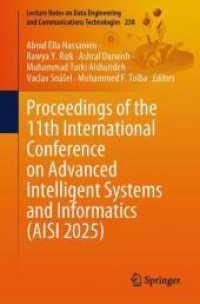- ホーム
- > 洋書
- > 英文書
- > Religion / Ethics
Full Description
How should one make sense of the Christian confession that God has instilled a 'sense of divinity' in every person? While other approaches have identified the sense with a perceptual or cognitive faculty or with the empirical reports of theistic belief, this Element advances an affective model of general revelation, which draws from the writings of the neo-Calvinist branch of the Reformed tradition. The author argues that the sense of divinity refers to an implanted 'feeling of divinity', a sensus numinis, and that this model makes better sense of the Christian witness, theologically re-orients the empirical findings from the cognitive science of religion, and eludes influential objections against the doctrine of general revelation.
Contents
1. General Revelation: The Questions and Initial Statement; 2. A Minimal Account: Historical Witnesses; 3. An Affective Model of General Revelation; 4. Re-Orienting the Findings of the Cognitive Science of Religion: Affect and Propositions; 5. Can Knowledge Precede Propositions? On Phenomenology; 6. Objections: Barth, Schilder, and McFarland; 7. Conclusion.








